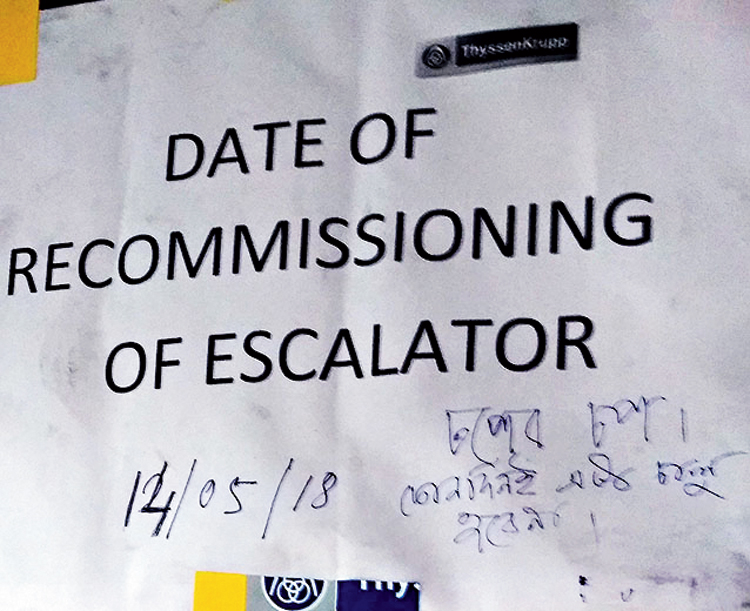Sir — The apologies tendered by the former German chancellor, Willy Brandt, and by the former Japanese prime minister, Nobusuke Kishi, deserve special praise. But seeking an apology for sins of the past cannot be seen as a matter of right.
No sane society can afford to exhaust time and energy demanding an apology from the present generation for atrocities committed by their ancestors. If each and every persecuted ethnic and religious group starts revisiting history and begins demanding apologies for past violations, then the international community would have to abandon its present responsibilities and devote its time in framing statements of regret only. Instead of indulging in zealous patriotism or trying to undo historical wrongs, the need of the hour is to draw lessons from the bitter, gory imperial past and see to it that such atrocities are not repeated in the future.
Indian nationalists have often demanded an apology from Britain for Jallianwala Bagh. Should not these patriotic souls examine the record of their own country in this respect? Should Maharashtra say sorry to Bengal for the violence of the bargis? When will the Hindutva brigade apologize to Muslims for the riots in Gujarat in 2002? Should not Christians demand an expression of regret for Kandhamal? Pandits from Kashmir have been wronged too.
India must set its own house in order before asking others to apologize.
Kajal Chatterjee
Calcutta

A notice at Calcutta's Chandni Metro railway station A Telegraph file picture
Stairway to hell
Sir — The escalators inside Metro stations are notoriously moody creatures. One such contraption had decided to move in the reverse direction in Dum Dum. Another one located at Chandni Chowk, perhaps inspired by the militant trade unionism of the Left era, goes on strikes without any warning. The hartal inconveniences hundreds of commuters, especially the elderly who are forced to climb a steep flight of stairs to get out of the station. The authorities had announced in 2018 that these ancient machines would be replaced. The pace of work for the project seems to be crawling.
Pritam Sanyal
Calcutta
Vanishing waters
Sir — Prasun Chaudhuri’s article, “Who stole my river?”(June 23), should come as an eye-opener for nature lovers. The rivers that have died cannot be revived. But the ones that still have some life left in them should be saved. Incidentally, dredging operations had begun in the Bagjola canal but they were not completed. Very few people know about the Noai khaal, which acts as a divider between New Barrackpore and Madhyamgram. Once upon a time, this was known as the Labanyabati river, which was used as a navigation channel to export tobacco and paddy. The Jamuna, in Kalyani, is in a shambles. The fates of Ichhamati and Churni are as deplorable. But human beings remain unaffected by their plight.
Summer temperatures are soaring every year. The changing climate has contributed to the rising seas as well as to cyclones. It is time we give back to nature what it has lost. Why not start with rivers and canals?
Alok Ganguly
Kalyani
Sir — A picture published with “Who stole my river?” shows a narrow channel of water that is the river, Ichhamati, which runs along the India-Bangladesh border. I happened to drive down to Taki, a town on the bank of the Ichhamati, in 2009. The wide river, with Bangladesh on the other bank, presented a stunning vista. Being a border town, Border Security Force jawans were camping there. A large number of idols are immersed in this stretch on Dashami during Durga Puja. People from both sides of the border flock to the bank to watch this spectacle.
It is shocking to see a river like Ichhamati in this state.
Ashok Kumar Ghosh
Calcutta
Sir — Man has had a close association with rivers since the dawn of civilization. The death of a river is like a bereavement. What is tragic is that rivers are perishing on account of mindless acts perpetrated by mankind.
Prasun Chaudhuri’s article describes Ichhamati’s struggle for survival. I had travelled on a boat across the Ichhamati on a few occasions about 25 years ago. At that time, the Ichhamati seemed as wide as the Ganges.
Sanjit Ghatak
South 24 Parganas
Crack the whip
Sir — The crack down on errant bikers by the Calcutta Police is a healthy sign. The Telegraph reported that more than 6,000 bikers have been booked over six nights for various offences. This nuisance did not appear suddenly. The police have been hesitant when it comes to arresting these rogues. This is because of the political patronage enjoyed by those who flout the law. The harassment of a model by bikers and the subsequent administrative action against some errant policemen seem to have spurred the men in uniform to action.
The Bharatiya Janata Party received an encouraging political response from Bengal during the general elections. The state government led by the Trinamul Congress is thus being forced to act to reclaim the support of the people.
Benu Kumar Bose
Calcutta
Sir — It is heartening that the Calcutta Police has issued a code of conduct for officers on how to deal with people who approach them in distress. However, the law enforcers often become law breakers themselves; breaking parking, traffic and road safety rules with impunity. Other policemen have been known to let such misdemeanours pass. Are the police not subject to the laws of the land? Will a code of conduct change this?
Harold Norman Hart
Calcutta










